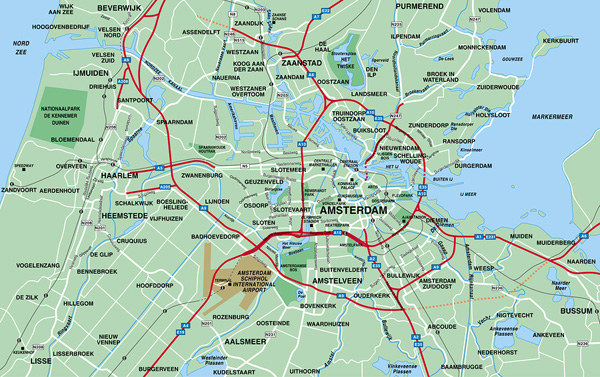Guide to Residency in The Netherlands
Summary: How to get residency in The Netherlands. A Guide for Expats, Retirees and Immigrants in The Netherlands.

Obtaining a residency visa in The Netherlands is not always easy, but our Guide to Residency in The Netherlands gives newcomers an overview of the steps involved and advice from others who have already navigated the process.
- Check if you need a visa to enter The Netherlands
- Visit the official website of the Dutch government at Immigration and Naturalisation Service (IND) to check if you need a visa based on your nationality.
- If required, apply for a provisional residence permit (MVV) at the Dutch embassy or consulate in your home country.
- Find a reason for residency
- Choose a residency purpose such as work, study, joining a family member, or starting a business.
- Collect the necessary documents that support your reason for residency, such as a job contract, university acceptance letter, or partnership documents.
- Apply for a residence permit
- Complete the application form for a residence permit, which can be found on the IND website.
- Submit the application form along with the required documents, either online or at an IND desk.
- Pay the application fee, which varies depending on the type of residence permit you are applying for.
- Register with the local municipality
- Upon arrival in The Netherlands, make an appointment with the local municipality (gemeente) to register in the Personal Records Database (BRP).
- Bring your passport, residence permit, and proof of address to the appointment.
- Apply for a Citizen Service Number (BSN)
- You will receive a BSN automatically when you register with the local municipality.
- The BSN is essential for opening a bank account, accessing healthcare, receiving a salary, and dealing with the Dutch tax office.
- Apply for a Tax Number
- Your BSN also serves as your tax number.
- For more information on taxes, visit the official website of the Dutch Tax and Customs Administration at Belastingdienst.
- Arrange health insurance
- It is mandatory to have health insurance in The Netherlands.
- Choose a health insurance provider and sign up for a basic health insurance package.
- Exchange your driver's license (if applicable)
- Check if your driver's license is valid in The Netherlands on the RDW website.
- If necessary, exchange your foreign driver's license for a Dutch one at your local municipality or the RDW.
- Learn Dutch and integrate
- Consider taking Dutch language courses to help with integration.
- Attend any mandatory integration courses or exams required by the Dutch government.
- Stay informed about your legal status
- Keep track of the expiration date of your residence permit and apply for an extension if necessary.
- Stay updated on any changes in immigration laws that may affect your residency status.
What tips do expats have about residency and visas in Netherlands?
"To travel to The Netherlands, foreign nationals typically require a Schengen visa. The process of applying for a visa requires applicants to schedule an appointment at their nearest Dutch embassy or consulate, where they must present their travel documents along with any additional supporting documentation specified by the consulate or embassy. The Netherlands also offers a variety of residence permits, which allow foreign nationals to remain in the country for extended periods of time. Depending on their intent, applicants can apply for a variety of residence permits such as study permits, employment permits, dependents' residence permits, family reunification permits, or others. The process of applying for a residence permit requires applicants to submit a completed application form, along with supporting documents such as proof of identity, proof of employment for employment permits and proof of registration for study permits. Once the application is evaluated and approved, applicants may then receive a residence permit granting them the right to stay in The Netherlands," commented one member living in The Netherlands.
About the Author
 Joshua Wood, LPC joined Expat Exchange in 2000 and serves as one of its Co-Presidents. He is also one of the Founders of Digital Nomad Exchange. Prior to Expat Exchange, Joshua worked for NBC Cable (MSNBC and CNBC
Primetime). Joshua has a BA from Syracuse and a Master's in Clinical and Counseling Psychology from Fairleigh Dickinson University. Mr. Wood is also a licensed counselor and psychotherapist.
Joshua Wood, LPC joined Expat Exchange in 2000 and serves as one of its Co-Presidents. He is also one of the Founders of Digital Nomad Exchange. Prior to Expat Exchange, Joshua worked for NBC Cable (MSNBC and CNBC
Primetime). Joshua has a BA from Syracuse and a Master's in Clinical and Counseling Psychology from Fairleigh Dickinson University. Mr. Wood is also a licensed counselor and psychotherapist.
Some of Joshua's articles include Pros and Cons of Living in Portugal, 10 Best Places to Live in Ireland and Pros and Cons of Living in Uruguay. Connect with Joshua on LinkedIn.
Additional Information:
- Netherlands Guide
- Healthcare & Health Insurance in Netherlands
- Members Talk about Healthcare & Health Insurance in Netherlands
- Best Places to Live in Netherlands
- Real Estate in Netherlands
- Guide to Real Estate in Netherlands
- Pros & Cons of Living in Netherlands
- Cost of Living in Netherlands
- A Guide to Healthcare in the Netherlands
- 10 Tips for Living in the Netherlands
- 10 Expat-Friendly Cities in The Netherlands and What It's Like Living There
- 6 Tips for Expats Having a Baby in The Netherlands
- 2025 Guide to Living in Netherlands
- Pros and Cons of Living in Netherlands 2025
- 2025 Guide to Moving to Netherlands



